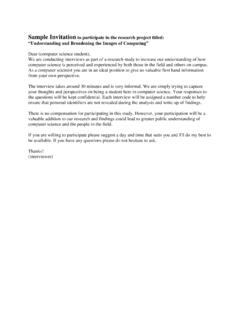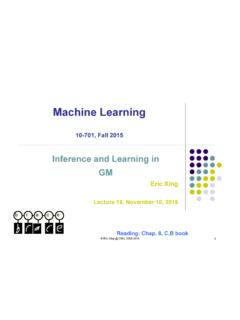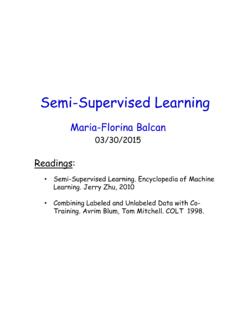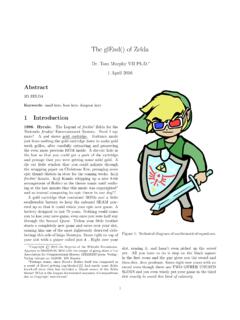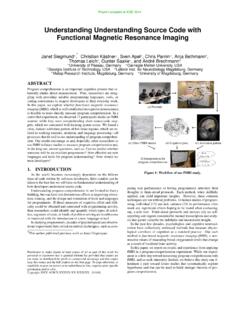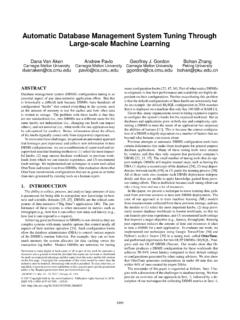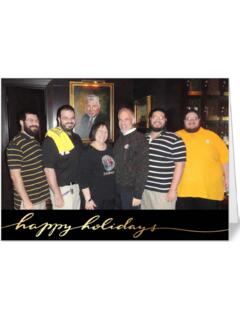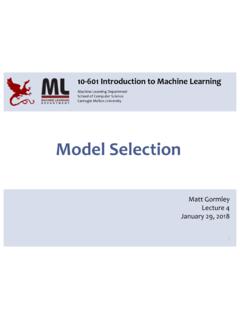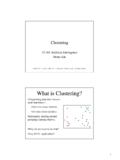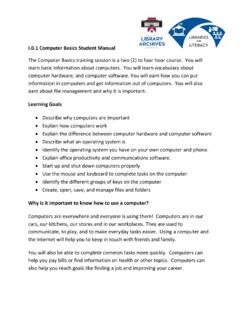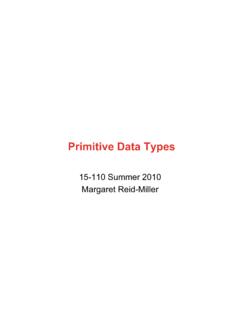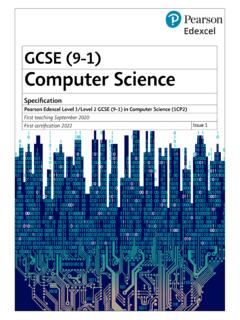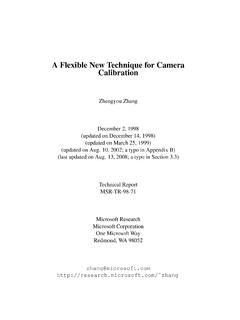Transcription of Applying to Ph.D. Programs in Computer Science
1 Applying to Programs in Computer ScienceMor Harchol-BalterComputer Science DepartmentCarnegie Mellon UniversityLast updated 20141 IntroductionThis document is intended for people Applying to Programs in computerscience or related areas. The document is informal in natureand is meant to expressonly the opinions of the author. The author is a professor of Computer scienceat CMU, and has been involved in the admissions processat CMU, , and direct any further questions you have after reading this documentto our Admissions Coordinator Do not send emailto the author of this I really want a What does a entail? is a .. of emphasis on courses.
2 Research process and advisor/advisee relationships .. and joys of research .. during the .. after the .. I get a ..713 The Application grades and classes .. scores and TOEFL .. statement .. Research Experience .. to ask for a letter .. to ask for a letter .. and Extracurriculars .. many schools should you apply to? ..174 Fellowship you need to apply .. of fellowships..185 Choosing the right program for you196 Current 2014 Rankings of CS Programs in the I really want a What does a entail? What is a is a long, in depth research exploration of one re typi-cally talking about 6 years. Byin depthwe mean that at the end of the youwill be the world expert or close to it in your particular area.
3 You will know morethan your advisor about your particular research area. You will know about yourresearch than anyone at your school. Byonewe mean that by the last couple yearsof your , you will typically be working on only one narrow problem. is not about breadth, it is about Lack of emphasis on coursesThe and degrees are aboutbreadthnot depth. The main requirement inthe and degrees is often a large numbers of or in2CS often entails taking 3 or 4 classes each contrast, a program typically requires typically less than 10 coursesduring the entire 6 years (at CMU there are 5 required core courses, and 3 re-quired electives ). The emphasis in the is not on classes, but rather onresearch.
4 A student will typically take classes only when she feels that theywill be useful in her research. The classes she takes may not even be in CS at may be in Statistics, Operations Research, Math, Psychology, Linguistics, oranything else useful for her particular research The research process and advisor/advisee relationshipsAs stated earlier, the main focus of a is research. You typically begin yourresearch at the time when you select an advisor. At most schools you pick anadvisor sometime after your first year. At CMU, we like you to start research rightaway, so you pick an advisor within a month or two of starting the is very different from taking students never makethe transition between taking classes and doing research in fact, at most schoolsonly 1/2 of the students who enter the program leave with a (at CMU,about 3/4 end up with a ).
5 Keep in mind that we re typically talking aboutstudents who came in with GPA s from a top undergraduate key differences between classes and research: In classes, the homework problems all have known answers andthe tech-niques needed for solving the problems have (usually) been introduced inclass. In research, you may be working on a problem for years without aclue of whether it is solvable. You will be the one inventing or finding thetechniques for solving the problem. In classes, you are assigned certain problems to work on. In research, youget to pick the problems. In fact it is your job to find good problems. By good we mean problems which are fundamental. For example, findinga system hack which makes a particular product like Cisco s Local Directorrun better is something that Cisco would love, but would not count as fun-damental research.
6 However discovering better algorithmsfor the problemof task assignment of jobs to hosts in a server farm is considered fundamen-tal research. You are also responsible for making sure that no one else hasalready solved this problem. This typically involves reading hundreds ofpapers on earlier research in this area. In classes, if you can t solve your homework problem, you canalways askother classmates. Even if none of your classmates know, you can ask theprofessor, who certainly knows the answer. In research, youare often work-ingalone, or at best with you advisor and maybe one other student. You are3free to ask anyone in the world for help, but they will typically not be able tohelp you, since they don t know the answer either if they did, it wouldn tbe research.
7 Many students have a hard time with working independently. In classes, you are constantly being given grades and you areconstantlybeing told what to do next. In research, there are no grades. There is someinstruction (from your advisor), but mostly it s up to you tobe self-motivatedand pro-active. In the classroom, there is a distance between you and your professor. In re-search, you and your advisor will work side-by-side. Your advisor will stilltell you what to do give you ideas for problems to work on, assign papersfor you to read, give you programming assignments, and oftengive you atime-line and schedule. However, when you and your advisor are workingon a problem together, you will work as equals.
8 You will both learn fromeach other. You will make discoveries together. Many students are surprisedto find that their advisor is very different in research than in the classroom. Aprofessor who is very dry in the classroom and often looks bored and uncom-fortable will often become extremely enthusiastic and excited when workingon research problems. In the classroom, you hear your professor discuss re-sults which he/she has already worked out. All problems are always solvedby the end of lecture. In research, you will watch your advisor think outloud and see how he/she thinks and reasons. Students often find this veryexciting. You may find that you think more quickly than your advisor, butyour advisor has more ideas than you.
9 Or you may find that you are betterat computations or coding, but your advisor is better at proofs or writing orspeaking. This surprises many students, who expect their advisor to be betterthan they are at everything. Don t pout, this is an unrealistic expectation. Asin all of life, you will be most successful if you simply figureout what skillsyour advisor has that you don t and work hard at picking up allof those skillswithout complaining. When taking classes, you will almost never see your professor alone. Whendoing research with an advisor, you will typically have 1 hour per weekwhen you meet with your advisor alone. If your advisor is especially busy(remember, professors have to do research, teach, apply forgrants, serve oncommittees, fly around giving talks, etc.)
10 You may only get 1/2 hour a your advisor is a newer faculty, you may get as much as 2 hours per s your job to plan ahead so as to maximize the utility of your time in mind that no one can give you a complete picture of whatresearch best way to learn what research is, and whether you like it, is simply to startdoing it. The earlier the better! Frustrations and joys of researchResearch can be very rewarding and very frustrating. Most students describe grad-uate school as a roller-coaster with tremendous highs and tremendous can come from not being able to solve a problem that you re work-ing on, or from having someone else beat you to the solution. Frustrations can comefrom loneliness.
